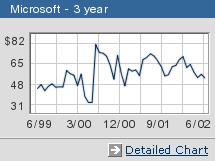
NEW YORK (CNN/Money) -
Attorneys for Microsoft Corp. and nine states that have rejected the federal government's proposed antitrust settlement met in court Wednesday, making their final arguments before the judge who will determine the ultimate resolution of the case.
U.S. District Judge Colleen Kollar-Kotelly, who has presided over the "remedy phase" of the four-year-old case, gave few hints about the direction in which she was leaning, and she is not expected to return her final decision until late this summer or early in the fall.
The federal court system has deemed Microsoft a monopolist in the market for computer operating systems and ruled that it has engaged in anti-competitive business practices that violate U.S. antitrust laws.
The U.S. Justice Department, which filed its antitrust suit against Microsoft in 1997, reached a settlement with the company last November that imposes a range of restrictions and requirements on business practices intended to prevent future antitrust violations. Nine of the states that had joined the Justice Department in its case have signed off on that settlement.

Nine other states -- California, Connecticut, Florida, Iowa, Kansas, Massachusetts, Minnesota, Utah and West Virginia -- and the District of Columbia broke with the Justice Department's proposal, arguing that it wasn't strong enough.
Among other things, they want the court to force Microsoft to offer a stripped-down version of its Windows operating system that enables PC makers to remove features such as Web browsers and digital media players. They also want to expand the amount of source code Microsoft would be required to disclose to its competitors.
Prior to Wednesday's closing arguments, Judge Colleen Kollar-Kotelly -- who heard testimony from witnesses including Microsoft Chairman Bill Gates -- ordered each side to "prioritize" its list of proposed remedies, "indicating which provisions are integral to the proposal's effectiveness and which are less significant."
And while she did not signal which side she was leaning toward during Wednesday's proceedings, some trial watchers suggested that the order in and of itself suggests that she is considering imposing at least some of the harsher measures the non-settling states are seeking.
"I think she's telling both sides that she's going to consider some of the tougher remedies," Amun Oruc, an antitrust attorney with the law firm Clifford Chance Rogers & Wells, told CNNfn's Street Sweep program.
For their part, the non-settling states said additional disclosure of the source code that would allow rival software to work with the Windows operating system was their most important demand. "If you forced us to articulate the single highest priority -- that's it," states' attorney Steve Kuney told the judge.
Second on the non-settling states' priority list is the requirement that Microsoft offer a version of Windows in which add-on features like Internet Explorer and the media player could be replaced by a competitor's software.
States' attorney Brendan Sullivan accused the company of "thuggish" business practices, telling the judge that Microsoft "still doesn't get it."
Microsoft attorney John Warden, in turn, accused Kuney of misrepresenting the company's position. "Microsoft does not claim that monopoly is the preferred form of industrial organization," he told Judge Kollar-Kotelly.
Warden also took exception to Sullivan's portrayal of Microsoft as some kind of scofflaw. "We haven't failed to get some message. We haven't claimed that we're immune from the law or anything of that kind," he said.
As far as Microsoft's priorities with respect to the proposed remedies are concerned, Sullivan said its top priority is to make sure the company is not forced to reveal more of its source code, insisting that doing so would substantially harm the company and give and unfair advantage to competitors, arguments that Gates and other Microsoft executives have made repeatedly in the past.
Microsoft also previously has argued that the states' demands go far beyond addressing the antitrust violations it actually committed and would harm consumers and the entire computer industry.
Shares of Microsoft (MSFT: down $1.63 to $54.36, Research, Estimates) ended Wednesday's session 2.9 percent lower amid a broader downturn in the technology sector.

-- from staff and wire reports
|

